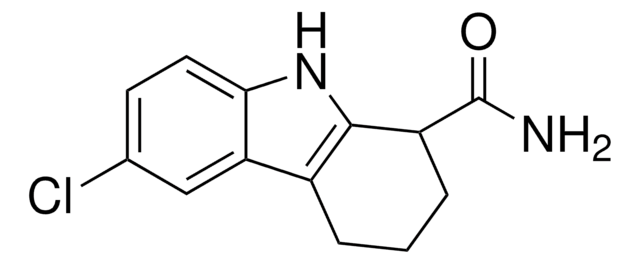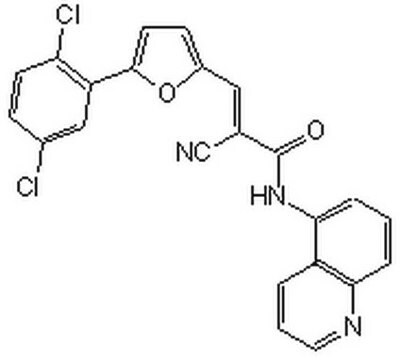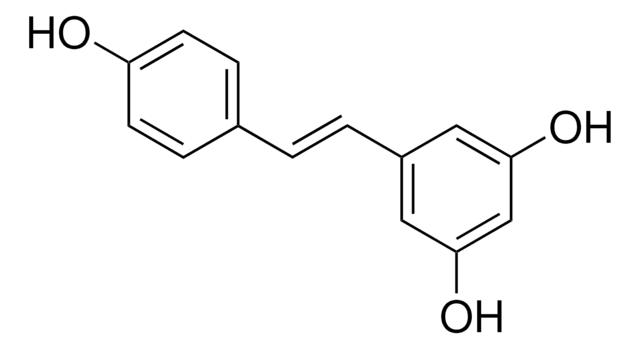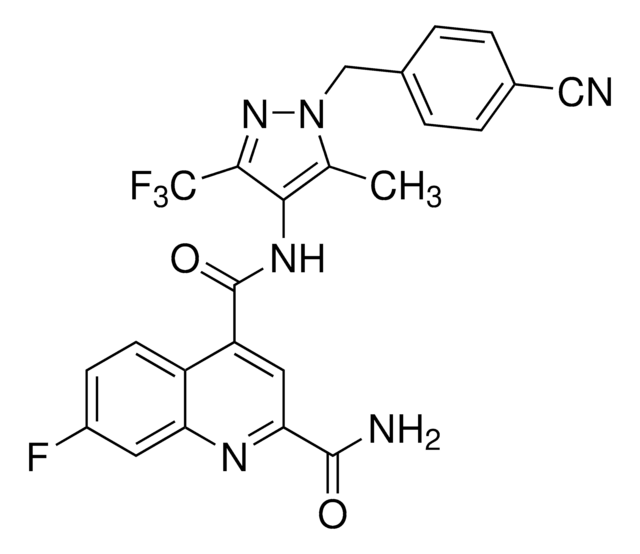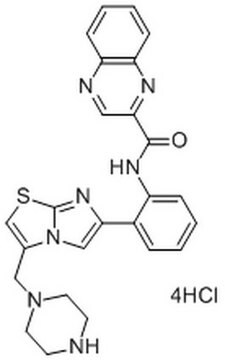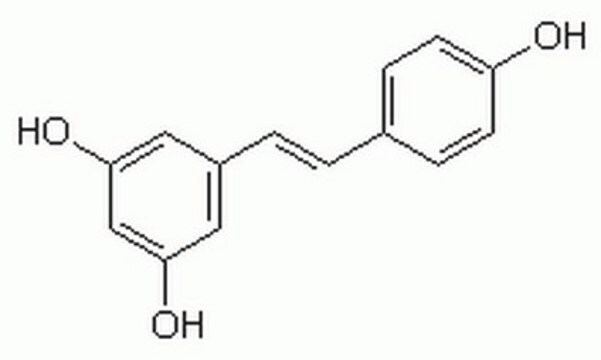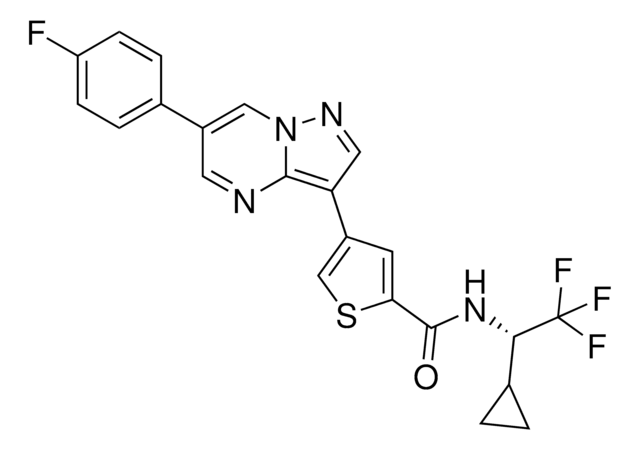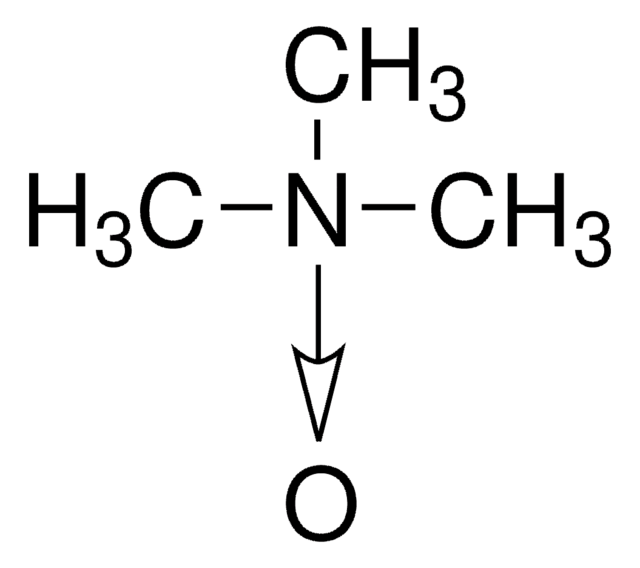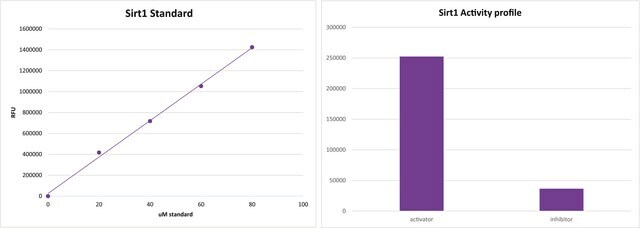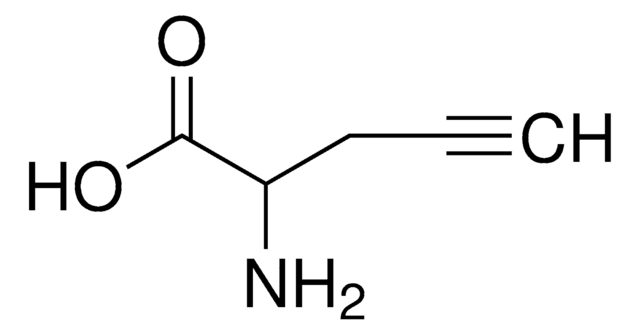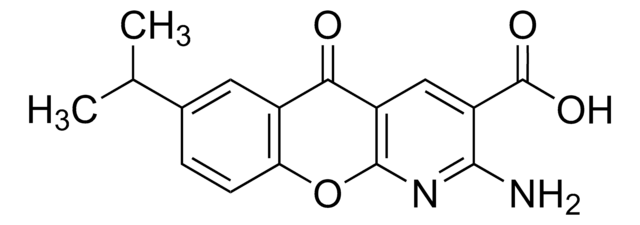567860
SRT1720
SRT1720, CAS 925434-55-5, is a cell-permeable inhibitor of the mitochondrial SIRT3. Inhibition is AceCS2-competitive (Ki = 0.56 µM; Km = 2.44 µM), but NAD+-uncompetitive (Ki = 0.34 µM; Km = 280 µM).
Synonim(y):
HAT Inhibitor XI, Histone Acetyltransferase Inhibitor XI, p300/CBP Inhibitor IX, SIRT3 Inhibitor II, N-(2-(3-(1-piperazynylometylo)imidazo[2,1-b]tiazol-6-ylo)fenylo)-2-chinolinokarboksyamid, Sirtuin-3 Inhibitor, SRT1720
About This Item
Polecane produkty
Poziom jakości
Próba
≥97% (HPLC)
Formularz
solid
producent / nazwa handlowa
Calbiochem®
warunki przechowywania
OK to freeze
protect from light
kolor
yellow
rozpuszczalność
DMSO: 2.5 mg/mL, clear, yellow
Warunki transportu
ambient
temp. przechowywania
−20°C
ciąg SMILES
O=C(C1=NC(C=CC=C2)=C2N=C1)NC3=CC=CC=C3C4=CN5C(SC=C5CN6CCNCC6)=N4
InChI
1S/C25H23N7OS/c33-24(22-13-27-20-7-3-4-8-21(20)28-22)29-19-6-2-1-5-18(19)23-15-32-17(16-34-25(32)30-23)14-31-11-9-26-10-12-31/h1-8,13,15-16,26H,9-12,14H2,(H,29,33)
Klucz InChI
IASPBORHOMBZMY-UHFFFAOYSA-N
Opis ogólny
Opakowanie
Ostrzeżenie
Inne uwagi
Minor, R.K., et al. 2011. Sci. Rep.1, 70.
Huber, J.L., et al. 2010. Future Med. Chem.2, 1751
Pacholec, M., et al. 2010. J. Biol. Chem.285, 8340
Jin, L., et al. 2009. Protein Sci.18, 514
Feige, J.N., et al. 2008. Cell Metab.8, 347
Milne, J.C., et al. 2007. Nature450, 712.
Informacje prawne
Kod klasy składowania
11 - Combustible Solids
Klasa zagrożenia wodnego (WGK)
WGK 3
Temperatura zapłonu (°F)
Not applicable
Temperatura zapłonu (°C)
Not applicable
Certyfikaty analizy (CoA)
Poszukaj Certyfikaty analizy (CoA), wpisując numer partii/serii produktów. Numery serii i partii można znaleźć na etykiecie produktu po słowach „seria” lub „partia”.
Masz już ten produkt?
Dokumenty związane z niedawno zakupionymi produktami zostały zamieszczone w Bibliotece dokumentów.
Klienci oglądali również te produkty
Nasz zespół naukowców ma doświadczenie we wszystkich obszarach badań, w tym w naukach przyrodniczych, materiałoznawstwie, syntezie chemicznej, chromatografii, analityce i wielu innych dziedzinach.
Skontaktuj się z zespołem ds. pomocy technicznej